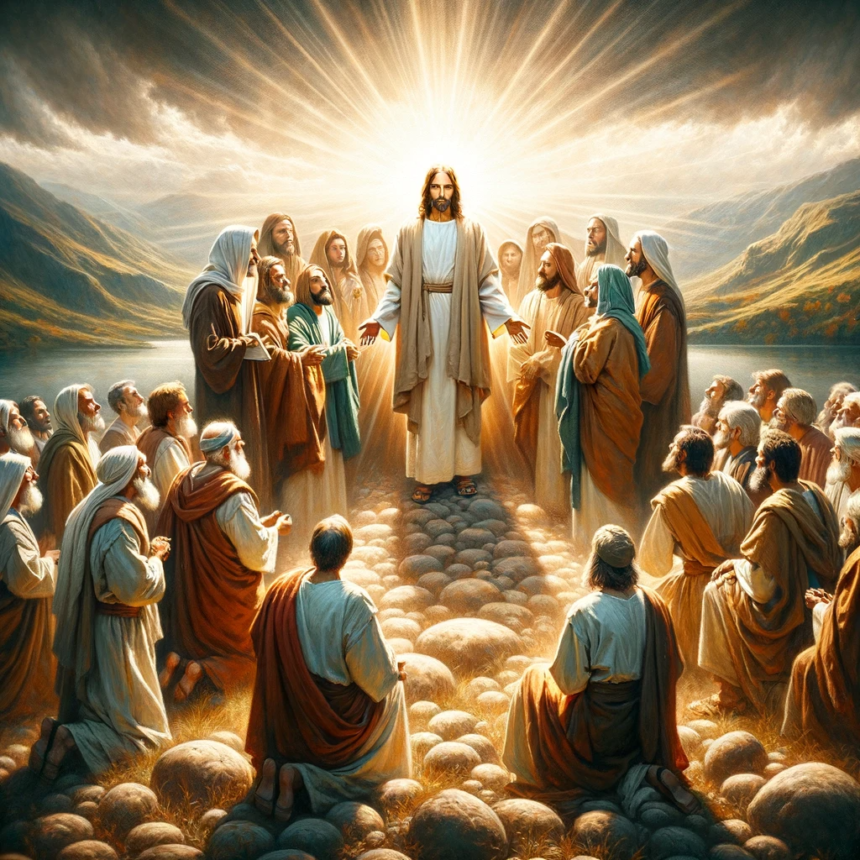Empowering Faith: Unveiling The Great Commission
Introduction
In the Christian faith, few directives carry as much weight and significance as The Great Commission. Found in the Gospel of Matthew, these are the parting words of Jesus Christ to His disciples, a powerful mandate that has echoed through the ages, shaping the course of Christian missionary work and personal evangelism. The Great Commission is not merely a call to action but a transformative command that intertwines faith, duty, and the spread of the Gospel to all corners of the earth. In this blog post, we embark on a journey to understand the depth and breadth of The Great Commission, exploring its historical roots, spiritual implications, and its enduring relevance in a rapidly changing world.
Historical Context of The Great Commission
The Great Commission, found in Matthew 28:19-20, marks a pivotal moment in Christian history. Spoken by Jesus after His resurrection and before His ascension, these words were addressed to the eleven disciples on a mountain in Galilee. This setting is crucial, as it represents a transition from Jesus’ earthly ministry to the disciples’ evangelistic mission.
Historically, the commission was given in a period of Roman dominance, where diverse cultures and religions intersected. For the disciples, the command to go beyond their cultural and geographical boundaries was revolutionary. It challenged their understanding of faith, pushing them to embrace a broader vision that included all nations. This commandment was a radical departure from the primarily Israel-focused ministry they had known.
In this era, the concept of a ‘risen Messiah’ preaching a message of universal salvation was both groundbreaking and contentious. The disciples, now apostles, were tasked with spreading this message in a world of varied beliefs and philosophies. This task required immense courage and faith, especially in the face of persecution and skepticism.
The Essence of Evangelism in The Great Commission
At the heart of The Great Commission is the call to evangelism. This is more than the act of preaching; it’s a call to share the life-changing message of Jesus Christ’s death and resurrection. Evangelism, as outlined in The Great Commission, involves making disciples – a process that goes beyond mere conversion to nurturing and guiding believers in a lifelong journey of faith.
The disciples were to be witnesses, not just within their localities but to the ends of the earth. This expansive view of evangelism meant that the Gospel was not just for the Jews but for every tribe, nation, and language. It was a message of hope and salvation for all humanity.
In the early church, this evangelistic mission saw the apostles traveling far and wide, often facing hostility and hardship. Their commitment laid the foundation for Christianity’s spread beyond Jerusalem, throughout the Roman Empire, and eventually across the world.
Modern evangelism continues this mission. It is about living and sharing the Gospel through words and actions. Whether through local community engagement or global missions, the essence of evangelism remains the same – to bring the transformative message of Christ’s love and salvation to everyone, everywhere.
Baptism: A Covenantal Act
Central to The Great Commission is the sacrament of baptism. Baptism, as instructed by Jesus, is not merely a ritual; it represents a profound spiritual reality. In the Christian tradition, baptism symbolizes the believer’s death to sin and new birth in Christ. It’s an outward expression of an inward faith, a public declaration of allegiance to Christ and His teachings.
The inclusion of baptism in The Great Commission underscores its importance in the Christian journey. It is both a personal commitment and a communal experience, signifying the believer’s entry into the Christian community. In the early church, baptism was a pivotal moment for new believers, often performed in the presence of the entire congregation as a witness to the individual’s faith and the community’s acceptance.
Today, baptism continues to be a vital element of Christian practice. It is a powerful act of obedience, a step of faith that connects believers to the core of Christian identity – the death, burial, and resurrection of Jesus Christ.
Teaching and Discipleship: The Lifelong Journey
Teaching is an integral component of The Great Commission. Jesus did not merely command His disciples to make converts; He called them to make disciples. This involves a process of teaching that goes beyond initial belief to encompass the whole counsel of God as revealed in the Scriptures.
Discipleship in the early church involved community living, where believers were continually taught the teachings of Jesus and the apostles. It was about growing in knowledge, faith, and practice. Discipleship was and remains a journey of transformation, where the believer gradually becomes more like Christ in character and action.
This teaching aspect of The Great Commission highlights the role of the church in nurturing believers. It involves structured teaching through sermons and Bible studies, as well as the informal transmission of values and principles through Christian fellowship. Discipleship is about creating a supportive environment where believers can grow, question, learn, and mature in their faith.
In contemporary Christian practice, discipleship takes many forms, from mentorship programs to small group studies, from online courses to international mission trips. Regardless of the method, the goal remains the same – to equip believers with the knowledge, skills, and character they need to live out their faith in a complex and often challenging world.
The Global Mission: Challenges and Triumphs
The Great Commission’s call to reach “all nations” underscores its inherently global nature. This directive set in motion the expansive spread of Christianity, transcending geographical, cultural, and linguistic barriers. The apostles, starting from Jerusalem, ventured into diverse regions, each presenting its unique challenges.
In the early stages of Christian mission, language and cultural differences posed significant barriers. Adapting the Gospel message to different cultural contexts without compromising its core truths was a delicate task. Furthermore, political environments often ranged from indifferent to openly hostile. The apostles and early missionaries faced persecution, imprisonment, and even martyrdom.
However, these challenges were also accompanied by triumphs. The resilience and dedication of these early missionaries led to the establishment of thriving Christian communities in regions as diverse as Africa, Asia, and Europe. Stories of conversion and church founding in these areas are testaments to the power and adaptability of the Gospel message.
In modern times, the global mission continues, adapting to new challenges such as secularism, religious pluralism, and digital distractions. Modern missionaries must navigate a world where traditional methods of evangelism might be less effective. Yet, this has also opened up innovative avenues for spreading the Gospel, including online platforms, humanitarian efforts, and culturally sensitive evangelism.
The Great Commission has also led to significant social and educational developments. Many missionaries have been involved in healthcare, literacy, and social justice initiatives, viewing these efforts as integral to their evangelistic mission. The impact of these endeavors has been profound, often bringing holistic improvement to the communities they serve.
The Great Commission in the Digital Age
n the 21st century, The Great Commission is being fulfilled in ways the early disciples could have never imagined. The advent of the digital age has revolutionized evangelism and discipleship. Social media, online streaming, podcasts, and virtual meetings have opened up new frontiers for spreading the Gospel.
Digital platforms have enabled the Word to reach corners of the world that physical missionaries cannot. People in restrictive countries, where traditional missionary work is impossible or dangerous, can now access Christian teaching online. Moreover, the digital space allows for the creation of virtual communities where believers can connect, learn, and grow in their faith.
However, digital evangelism is not without its challenges. The impersonal nature of online interactions can sometimes hinder the deep, relational aspects of discipleship. There’s also the risk of misinformation and the challenge of presenting the Gospel in a way that is engaging and relevant in the fast-paced digital world.
Despite these challenges, the digital age presents unprecedented opportunities for fulfilling The Great Commission. By leveraging technology, Christians can continue the mission of spreading the Gospel to all nations, adapting to the changing landscape of our world.
Living The Great Commission Today
Living out The Great Commission in the contemporary world involves both global endeavors and local actions. Every Christian is called to be a part of this divine mandate, whether it’s through overseas mission work, local community service, or simply sharing one’s faith in everyday life.
For many, this means actively participating in their local church’s outreach programs, supporting missionaries, or engaging in acts of service that demonstrate Christ’s love to others. It also involves personal witness – living a life that reflects Jesus’ teachings and speaking about one’s faith to friends, family, and colleagues.
Furthermore, living The Great Commission today means being culturally sensitive and aware. Understanding and respecting the diverse cultural contexts in which the Gospel is shared is crucial. It’s about presenting the timeless message of Jesus in a way that is relevant and understandable to different audiences.
Conclusion
The Great Commission remains a foundational aspect of Christian identity. Its call to evangelism and discipleship resonates through time, continually challenging and inspiring believers to spread the Gospel’s transformative message. As the world evolves, so do the methods and opportunities for fulfilling this mandate. Yet, the core message remains the same – to make disciples of all nations. Embracing The Great Commission is about joining a centuries-long legacy of faith, hope, and love – a journey that every believer is invited to partake in.





